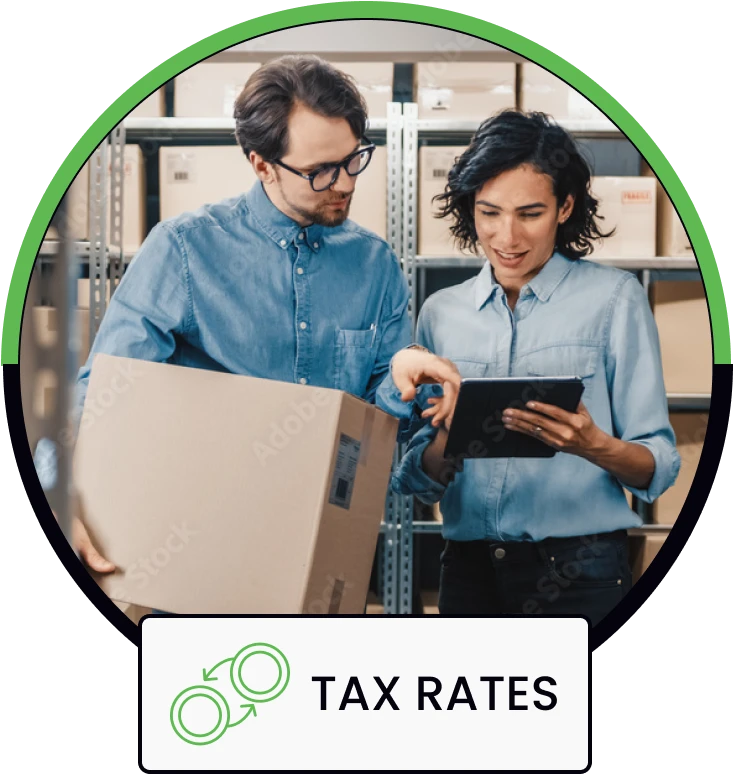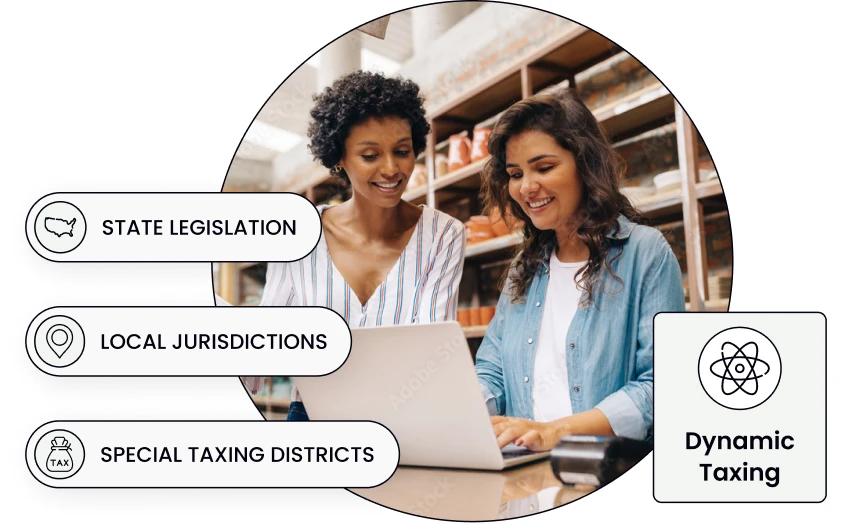- Tax compliance
How to avoid the anxiety of ever-changing tax rates and rules








"Adipisicing non eiusmod ut quis ea sit et dolor eiusmod laboris. Esse incididunt aliquip eu velit cupidatat mollit. Nostrud nostrud officia eu deserunt quis occaecat"
John Doe
Accurately Collecting Sales Tax
The right rate every time

Tax is dynamic.
Sales tax rates in the United States can change at various intervals, and the frequency of these changes can vary depending on several factors.
State Legislation
State governments have the authority to adjust sales tax rates.
Local Jurisdictions
Cities, counties, and special districts can impose their own sales tax rates.
Special Taxing Districts
Some states have special taxing districts that impose additional sales taxes for specific purposes
Solution
Our solution seamlessly updates tax rates in your system as they change. If you trade through a selling partner like Meta, Etsy, Amazon, etc., our solution automatically takes into account that they’ve collected sales tax on your sales.
The Facts
The Taxman wants to know what you sold DTC and B2B in every state.
Thresholds?
B2B (business-to-business) and B2C (business-to-consumer) nexus thresholds refer to the criteria that determine when a business has established sufficient presence or activity within a particular jurisdiction to trigger sales tax obligations.
Solution
Our solution helps you identify where you have established nexus, whether through sales revenue, transaction volume, or other factors defined by state tax laws. The solution offers real-time visibility into nexus thresholds and provides automated notifications to alert you when your business approaches or exceeds these thresholds.
Nexus thresholds apply to B2B and DTC
Peace of mind: Nexus and State tax thresholds

Exemption certificate
Peace of mind: Exemption Certificates
Problem
Failing to obtain customer tax exemption certificates can expose you to various liabilities and risks, including financial losses, legal disputes, and damage to your reputation (see FAQ). You must obtain documentation from your customers and maintain accurate records to ensure compliance with tax laws and regulations.
Solution
Streamline your tax compliance with our solution. Easily collect, store, and track tax exemption certificates from customers, reducing the risk of fines, audits, and disputes.
Tax automation by

Tax filing
Peace of mind: Filing Taxes
Problem
Preparing and filing tax returns to meet deadlines consumes time and expense.
Solution
Our solution automates the complex and time-consuming tasks associated with tax preparation and filing.
This helps wholesalers accurately calculate tax obligations, prepare and file returns, and manage remittances across multiple jurisdictions.
FAQ
What is Nexus?
Nexus refers to a business’s connection or presence within a specific jurisdiction, often a state or locality, which subjects it to the jurisdiction’s laws, including tax laws. In the context of sales tax, nexus determines whether a business must collect and remit sales tax on transactions conducted within that jurisdiction.
Nexus can be established through various factors, such as physical presence (e.g., having a brick-and-mortar store or office), economic activity (e.g., reaching a certain threshold of sales or transactions), or other factors defined by state tax laws.
Understanding the nexus is crucial for businesses to ensure compliance with sales tax obligations and avoid potential penalties or legal issues.
I don’t have customer tax exemption certificates; what’s my exposure?
For a wholesaler who has not obtained tax exemption certificates from their customers, there can be several potential liabilities and consequences:
1. Sales Tax Obligations: Without tax exemption certificates, the wholesaler may be required to collect and remit sales tax on transactions involving taxable goods or services. Failing to do so could result in penalties, fines, or legal action from tax authorities for non-compliance with tax laws.
2. Financial Losses: If the wholesaler fails to collect sales tax from non-tax-exempt customers, they may bear the financial burden of paying the uncollected taxes out of their funds. This can impact the wholesaler’s profitability and cash flow, leading to economic losses.
3. Customer Disputes: Customers who believe they are entitled to tax exemptions but still need to provide the necessary documentation may dispute the sales tax charges levied by the wholesaler. This can result in strained relationships, customer complaints, or even legal disputes, affecting the wholesaler’s reputation and business credibility.
4. Audit Risks: Non-compliance with tax laws, including failure to obtain tax exemption certificates, can increase the risk of audits by tax authorities. During an audit, the wholesaler may be required to provide documentation and evidence to support their tax-exempt sales, and failure to do so could result in additional penalties or sanctions.
5. Compliance Costs: Besides potential fines or penalties, the wholesaler may incur additional costs associated with rectifying non-compliance issues, such as hiring tax advisors or consultants, conducting internal audits, or implementing new processes and controls to ensure future compliance.
Failing to obtain customer tax exemption certificates can expose wholesalers to various liabilities and risks, including financial losses, legal disputes, and damage to their reputation. Wholesalers must understand their tax obligations, obtain the necessary documentation from customers, and maintain accurate records to ensure compliance with tax laws and regulations.
Can you explain Nexus and Tax Thresholds and how they affect B2B transactions?
B2B (business-to-business) and B2C (business-to-consumer) nexus thresholds refer to the criteria that determine when a wholesaler has established sufficient presence or activity within a particular jurisdiction to trigger sales tax obligations. These thresholds vary depending on the jurisdiction and can be based on factors such as sales revenue, transaction volume, or the number of transactions conducted within a certain period.
For B2B transactions, the nexus threshold typically applies to sales made to other businesses within the jurisdiction. Once a wholesaler surpasses the specified threshold, it must collect and remit sales tax on its B2B sales within that jurisdiction.
For B2C transactions, the nexus threshold applies to sales made directly to consumers within the jurisdiction. Similarly, once the threshold is met or exceeded, the wholesaler must collect and remit sales tax on its B2C sales to customers within that jurisdiction.
The liability for failing to meet sales tax obligations varies depending on the jurisdiction’s laws and regulations. Businesses that exceed the nexus threshold but fail to collect and remit sales tax may face penalties, fines, or legal action from tax authorities for non-compliance.
Additionally, they may be responsible for paying any unpaid sales tax owed, along with interest and other fees.
Wholesalers must understand the nexus thresholds in each jurisdiction where they conduct business and monitor their sales activity closely to ensure compliance with sales tax laws.
Failure to do so can result in significant financial and legal consequences. Consulting with tax professionals or legal experts can help wholesalers navigate nexus requirements and ensure compliance with sales tax obligations.
How often do Sales Tax rates change?
The short answer is often and unpredictably.
Sales tax rates in the United States can change at various intervals, and the frequency of these changes can vary depending on several factors, including:
- State Legislation: State governments can change sales tax rates through legislative action. Some states may adjust their sales tax rates annually as part of their budgetary or tax policy decisions. In contrast, others may change more frequently based on economic conditions or other factors.
- Local Jurisdictions: In addition to state sales tax rates, many local jurisdictions, such as cities, counties, and special districts, can impose their own sales tax rates. These local rates may change independently of state rates and can occur more frequently, depending on local government decisions.
- Special Taxing Districts: Some states have special taxing districts or authorities that impose additional sales taxes for specific purposes, such as transportation projects or economic development initiatives. Changes to these special district taxes can occur sporadically based on the district's needs.
While there is no fixed schedule for sales tax rate changes across the United States, businesses should stay vigilant and monitor for updates from state and local tax authorities to ensure compliance with current tax rates. Additionally, companies can utilize tax automation software and services, such as those offered by Avalara, to stay informed about sales tax rate changes and seamlessly update their systems accordingly.
